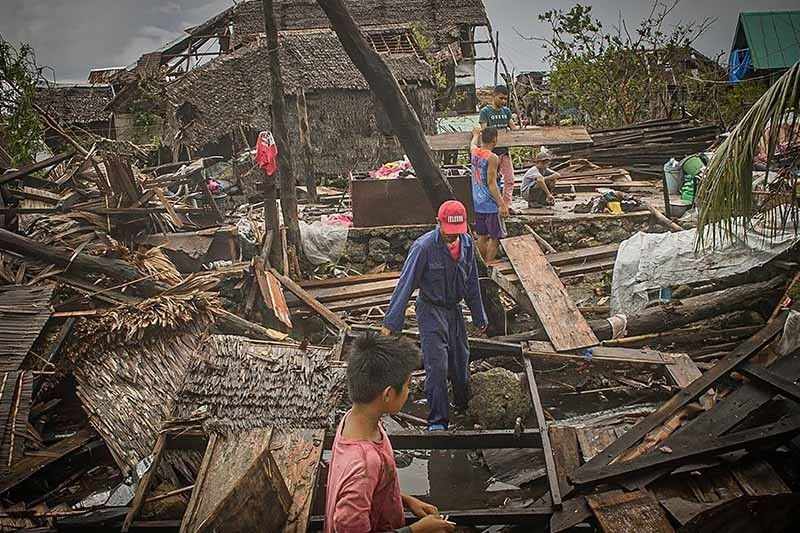'Business as usual' feared as COVID-19 response, recovery derail climate action plan

MANILA, Philippines (Updated; First published June 5, 2020) — The coronavirus pandemic is hampering the country’s move to review and revisit its climate plans as the government faces the task of containing the crisis and restarting a badly-damaged economy in the weeks and months to come.
The Climate Change Commission—tasked to coordinate and evaluate the government's programs and action plans on climate change—is in the process of finalizing the Philippines’ nationally determined contribution (NDC) for sectors such as agriculture, waste, industry, transport, forestry and energy.
An NDC is how the government plans to reduce greenhouse gas emissions and adapt to the impacts of climate change.
The health crisis that has so far infected over 20,000 people in the Philippines is threatening the process of setting an “ambitious yet realistic NDC target,” the country's climate body said.
"The pandemic has certainly made this painstaking process of NDC formulation more difficult to do," Climate Change Commissioner Rachel Anne Herrera told Philstar.com in an online exchange.
"While this is extremely important, ensuring the recovery of those infected with COVID-19 and the safety of everyone in the community has been the immediate priority of our government and perhaps for other states for the past months and weeks," she added.
The Philippines' commitment
In 2015, the Philippines—an archipelagic nation vulnerable to disasters made worse by climate change—committed to cut by 70% its carbon emissions by 2030. But the emission reduction target was conditional on assistance from the international community.
Studies, however, found that emission reduction targets submitted by countries put the world on track for warming of 2.7 to 3.7°C, far above the Paris Climate Agreement goals of limiting global warming well below 2°C above pre-industrial levels while pursuing efforts for a tougher ceiling of 1.5°C.
Intergovernmental Panel on Climate Change, UN’s climate science advisory panel, said carbon dioxide pouring into the atmosphere must be halved by 2030 and reach “net zero” by mid-century if the goal of 1.5°C is to be met.
In March 2017, President Rodrigo Duterte signed the historic Paris agreement on climate change. He earlier threatened he would not honor the pact believing it would hurt the Philippines' effort to industrialize.
The Senate unanimously voted to ratify the agreement within two weeks.
Climate actions among COVID-19 casualties
Global efforts to address the climate crisis are among the casualties of COVID-19. International meetings related to climate such as the critical United Nation’s climate summit—where nations were expected to ramp up plans to fight the warming of the planet—have been disrupted by the pandemic and has been pushed back to November 2021.
Another 2020 deadline in the original schedule was the submission of revised NDCs.
But while the COVID-19 crisis is seen to hinder the country’s process of finalizing its targets, the CCC said it is eyeing to complete the NDC “as soon as possible.”
For Greenpeace Philippines, the disruption of environmental-related international meetings should not threaten efforts to meet climate and biodiversity pledges.
“The current pandemic should actually be the impetus to strengthen the efforts of countries on these issues and to even go beyond the commitments laid out before the pandemic happened. COVID-19 has changed the playing field and the priorities and assumptions on which the commitments in the past were made,” Lea Guerrero, Greenpeace Philippines country director, told Philstar.com in an online exchange.
‘Better’ normal
Guerrero said that the pandemic has exposed the devastating impacts of the current "business" framework of extraction-production or trade-consumption-disposal on people and the ecosystems.
She explained that the system concentrated wealth to very few people and left the majority without safety nets, making it difficult for governments to cope with the effects of the health crisis.
Experts stressed that the destruction of wild habitats as well as the illegal wildlife trade increase opportunities for pathogens to jump from animals to human, giving rise to fatal illnesses such as COVID-19.
As the country revives an economy slammed by the crisis, hundreds of billions will go to infrastructure projects and support for the recovery of the private sector. But the Greenpeace country director warned against trying to return to pre-pandemic status quo.
“There is a real danger that the government and private sector could reinvest in a business-as-usual scenario, including more dirty investments, and will exacerbate inequitable socio-economic conditions by developing private-for-profit services that neglect the needs, concerns and rights of women, indigenous peoples, workers and the marginalized communities,” Guerrero said.
“This is exactly what the government needs to avoid,” she added.
For example, the dominance of coal in the Philippines has exposed tens of thousands who live in communities next to power plants to poisonous air from coal burning, transport and extraction.
Instead, the government must put climate action and the vulnerable sectors at the center of its plans for social and economic recovery from COVID-19 by funnelling funds to programs that will stimulate renewable energy uptake and infrastructure that will enable the reduction of vehicles on the road, Greenpeace stressed.
“Instead of ‘restarting the economy,’ the government needs to ‘reshape the economy’ to invest the vast amounts of finance they are earmarking not to where they have traditionally placed it in the past, but to areas and sectors that will resolve long-term challenges such as the climate crisis, planetary limits and environmental destruction, as well as poverty and injustice,” Guerrero said.
CCC, meanwhile, said it is actively engaging with House lawmakers deliberating the Better Normal Bill “so that the new law shall have a holistic approach rather than solely focusing on social distancing and hygiene.”
“To address the pandemic, policies must promote a thriving natural environment and reduce people's vulnerability to future crises caused by climate change, natural hazards, and man-made disasters,” Herrera said.
- Latest
- Trending




























